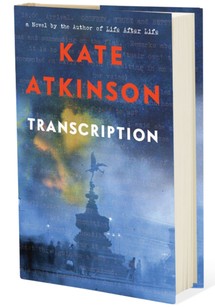Transcription
By Kate Atkinson
352 pages;
Little, Brown and Company
Saga is a small word for a big story. In novel form, they come with a thick spine and an ambitious scope—whole eras are contained in their pages. The most masterful among them do more than narrate events and occupy our leisure hours. They help us see what we think we know in a different light. That's what Kate Atkinson again achieves with her 10th novel, Transcription (Little, Brown), an ingeniously engineered work of historical fiction that experiments mischievously with time, literary allusion, and how humans employ artifice, but is ultimately more concerned with the ways stories resound through the ages than with the events themselves.
As the book opens, it's 1981, and 60-year-old Juliet has been struck by a car on the streets of London, where she's returned after years abroad. "It was all such a waste of breath," she reflects, lying on the road. "War and peace. Peace and war. It would go on forever without end."
Most of the tale takes place in earlier decades. In 1940, at 18, Juliet joins a unit of M15 charged with transcribing secretly recorded conversations between Nazi sympathizers and a British spy posing as an agent of the Third Reich. Her tasks as a typist are tedious—until she herself is enlisted to work undercover. "And my place in the plot, Juliet wondered? Heroic woman in danger? Or the villain of the piece?" (This is but one of many instances where the novel's protagonist is imagining herself as a character in a fictional story.)
It's in the postwar period, after Juliet returns to the civilian world, though, when Atkinson's literary powers burn brightest. Here she focuses more on the lives people lead in the shadows than on the big stage behind them. In Juliet's new job at the BBC, she produces a program called Children's Hour. One episode is dedicated to Daedalus, whose son, Icarus, flew too close to the sun and fell from the sky. "It was the perfect plot," Juliet thinks. "In some ways it was the only plot." Maybe so, but Atkinson proves that a truly brilliant storyteller will find a new way to tell it.
— Claire Luchette


